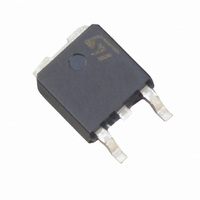STD90N03L STMicroelectronics, STD90N03L Datasheet - Page 9

STD90N03L
Manufacturer Part Number
STD90N03L
Description
MOSFET N-CH 30V 80A DPAK
Manufacturer
STMicroelectronics
Series
STripFET™r
Datasheet
1.STD90N03L.pdf
(16 pages)
Specifications of STD90N03L
Fet Type
MOSFET N-Channel, Metal Oxide
Fet Feature
Logic Level Gate
Rds On (max) @ Id, Vgs
5.7 mOhm @ 40A, 10V
Drain To Source Voltage (vdss)
30V
Current - Continuous Drain (id) @ 25° C
80A
Vgs(th) (max) @ Id
1V @ 250µA
Gate Charge (qg) @ Vgs
32nC @ 5V
Input Capacitance (ciss) @ Vds
2805pF @ 25V
Power - Max
95W
Mounting Type
Surface Mount
Package / Case
DPak, TO-252 (2 leads+tab), SC-63
Configuration
Single
Transistor Polarity
N-Channel
Resistance Drain-source Rds (on)
0.0057 Ohm @ 10 V
Drain-source Breakdown Voltage
30 V
Gate-source Breakdown Voltage
+/- 20 V
Continuous Drain Current
80 A
Power Dissipation
95000 mW
Maximum Operating Temperature
+ 175 C
Mounting Style
SMD/SMT
Minimum Operating Temperature
- 55 C
Lead Free Status / RoHS Status
Lead free / RoHS Compliant
Other names
497-7979-2
STD90N03L
STD90N03L
Available stocks
Company
Part Number
Manufacturer
Quantity
Price
Part Number:
STD90N03L
Manufacturer:
ST
Quantity:
20 000
STD90N03L - STD90N03L-1
Appendix A
Figure 16. Buck Converter: Power Losses Estimation
The power losses associated with the FETs in a Synchronous Buck converter can be
estimated using the equations shown in the table below. The formulas give a good
approximation, for the sake of performance comparison, of how different pairs of devices
affect the converter efficiency. However a very important parameter, the working
temperature, is not considered. The real device behavior is really dependent on how the
heat generated inside the devices is removed to allow for a safer working junction
temperature.
The low side (SW2) device requires:
■
■
■
■
■
■
The high side (SW1) device requires:
■
■
■
Very low R
Small Qgls to reduce the gate charge losses
Small Coss to reduce losses due to output capacitance
Small Qrr to reduce losses on SW1 during its turn-on
The Cgd/Cgs ratio lower than Vth/Vgg ratio especially with low drain to source
voltage to avoid the cross conduction phenomenon;
Small Rg and Ls to allow higher gate current peak and to limit the voltage feedback on the
gate
Small Qg to have a faster commutation and to reduce gate charge losses
Low R
DS(on)
DS(on)
to reduce the conduction losses.
to reduce conduction losses
9/16













